(完整版)不定式和动名词作主语的区别
动名词与不定式的区别
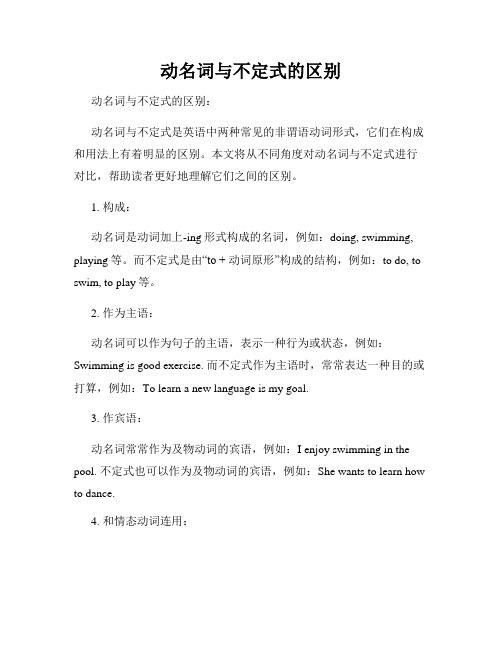
动名词与不定式的区别动名词与不定式的区别:动名词与不定式是英语中两种常见的非谓语动词形式,它们在构成和用法上有着明显的区别。
本文将从不同角度对动名词与不定式进行对比,帮助读者更好地理解它们之间的区别。
1. 构成:动名词是动词加上-ing形式构成的名词,例如:doing, swimming, playing等。
而不定式是由“to + 动词原形”构成的结构,例如:to do, to swim, to play等。
2. 作为主语:动名词可以作为句子的主语,表示一种行为或状态,例如:Swimming is good exercise. 而不定式作为主语时,常常表达一种目的或打算,例如:To learn a new language is my goal.3. 作宾语:动名词常常作为及物动词的宾语,例如:I enjoy swimming in the pool. 不定式也可以作为及物动词的宾语,例如:She wants to learn how to dance.4. 和情态动词连用:当动名词和情态动词连用时,情态动词后面必须跟动名词形式,例如:I can't stand smoking. 而不定式和情态动词连用时,情态动词后跟不定式的原形,例如:She must study hard to pass the exam.5. 表达目的:动名词常用来表达一个动作或状态的目的,例如:I went to the gym for swimming. 而不定式也可以表达目的,例如:She walked fast tocatch the bus.通过以上对比,我们可以清楚地看到动名词与不定式在用法上的区别。
在实际运用中,我们需要根据句子的语境和需要选择合适的形式,以确保句子表达准确清晰。
希望本文的对比能帮助读者更好地理解动名词与不定式之间的区别,提高英语写作和表达的能力。
不定式和动名词的区别
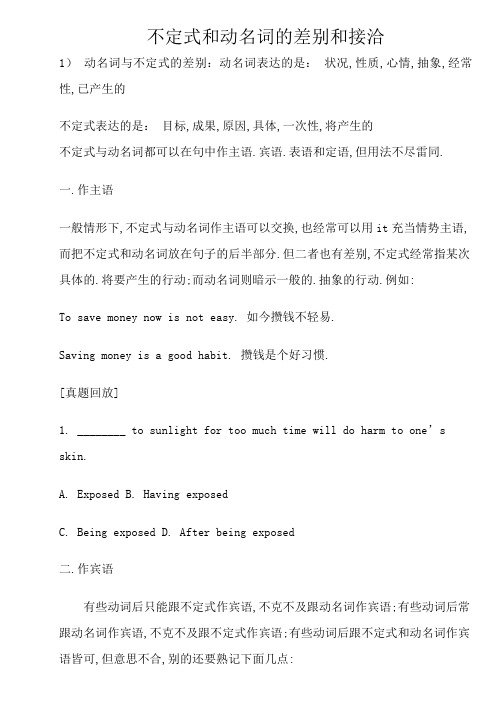
不定式和动名词的差别和接洽1)动名词与不定式的差别:动名词表达的是:状况,性质,心情,抽象,经常性,已产生的不定式表达的是:目标,成果,原因,具体,一次性,将产生的不定式与动名词都可以在句中作主语.宾语.表语和定语,但用法不尽雷同.一.作主语一般情形下,不定式与动名词作主语可以交换,也经常可以用it充当情势主语,而把不定式和动名词放在句子的后半部分.但二者也有差别,不定式经常指某次具体的.将要产生的行动;而动名词则暗示一般的.抽象的行动.例如:To save money now is not easy. 如今攒钱不轻易.Saving money is a good habit. 攒钱是个好习惯.[真题回放]1. ________ to sunlight for too much time will do harm to one’s skin.A. ExposedB. Having exposedC. Being exposedD. After being exposed二.作宾语有些动词后只能跟不定式作宾语,不克不及跟动名词作宾语;有些动词后常跟动名词作宾语,不克不及跟不定式作宾语;有些动词后跟不定式和动名词作宾语皆可,但意思不合,别的还要熟记下面几点:1)下列短语中的to是介词,厥后跟动名词,不跟不定式.be(get) used to习惯于;look forward to希望;pay attention to留意;get down to开端卖力做;lead to通向.导致;prefer doing ... to doing ...情愿做……而不肯做……;stick to保持;devote one’s life(time, oneself) to献身于.致力于;object to否决;in addition to ...除……之外;on the way to ...在去……的路上.刚要成为……;等等.2)不定式除可用在except, but, besides等后作宾语之外,一般不必作介词宾语.此时,不定式可否省略to,取决于其前是否有行动动词do或其响应情势.有则省略,无则不克不及省略.例如:She did nothing but wash some clothes that day. 那天她除了洗一些衣服之外什么也没做.We had no choice except to walk home. 除了走着回家我们别无选择.3) 动名词除了其一般式doing,还有完成式having done以及一般式的自动情势being done和完成式的自动情势having been done;动名词前可以加上逻辑主语,组成动名词的复合构造:sb.’s doing.例如:I’m sorry for not having kept my promise.异常抱愧,我没能遵照诺言.(not having kept my promise产生在am sorry之前)Do you mind Mary being left alone at home?你介怀玛丽被单独一小我留在家里吗?4) 不定式的完成式to have done暗示在谓语动词之前已经产生的动作,而不定式的一般式to do暗示动作将要产生.不定式还有其自动情势:to bedone(暗示将来的自动动作)和to have been done(暗示曩昔的自动动作).三.作表语不定式与动名词作表语时的差别与作主语时雷同.例如:My job is teaching English. 我的工作是教英语.(泛指,多次性抽象行动) Your task is to go and help the farmers.你的工作是去帮忙那些农平易近.(特指,一次性具体行动)四.作定语不定式多为后置定语,动名词多为前置定语;不定式多暗示将来的动作,动名词只能暗示事物的属性.用处等.例如:He is looking for a room to live in.他正在找一间房子去住.Take these sleeping pills and you’ll sleep better. 吃了这种安眠药,你会睡得更好.留意:不定式作定语时平日与其前的名词(代词)组成动宾关系.假如作定语的不定式是不及物动词,厥后平日要加上响应的介词.例如:Please give me a knife with which to cut.2)鄙人列情形下,一般要用不定式:①hate,like,love前有would(should)时,如:I'd like to have a cup of coffee.②当谓语动词begin,continue,start等是进行式时,如:Thestudents arestarting to work on the diffic ult math’s problem.③begin,continue,start与know,understand等状况动词连用时,如:I soon began to understand what was happening.⒋advise,allow,encourage,forbid,permit等动词后接动名词作宾语,或带不定式作宾语补足语.如:Our teachers don't permit our/us swimming in the lake. Our teachers don't permit us to swim in the lake. 3)部分动词后接不定式或动名词时,意义不同较大,应依据句子语境选择应用.①forget,remember,regret后接不定式,暗示如今或将来的动作,接动名词暗示动作已经产生.如:Don't forget to post the letter for me. Have you forgotten meeting her in BeijingAirport? Remember to close the windows before you leave.I remember writing him a letter a year ago. We regret to tell you that all of you are not invited toattend the meeting.They regretted ordering these books from abroad. 动名词与不定式语义不合的有11 组: 1 forget doing/to do forget to do忘却要去做某事.(未做) forget doing忘却做过某事.(已做) The light in the office is stil on. He forgot to turn it off. 办公室的灯还在亮着,它忘却关了.(没有做关灯的动作) He forgot turning the light off. 他忘却他已经关了灯了.( 已做过关灯的动作) Don't forget to come tomorrow.别忘了明天来.(to come动作未做) 典范例题---- The light in the office is still on. ---- Oh,I forgot___.A. turning it offB. turn it offC. to turn it offD. having turned it off 答案:C.由the light is still on 可知灯亮着,即关灯的动作没有产生,是以用forget to do sth. 而forget doing sth暗示灯已经关上了,而本身忘却了这一事实.此处不相符题意 2 stop doing/to do stop to do停滞,中止本来做的事,开端做别的一件事stop doing停滞正在做的事They stop to smoke a cigarette. 他们停下来,抽了根烟.I must stop smoking..我必须戒烟了. 典范例题 She reached the top of the hill and stopped ___on a big rock by the side of the path.A. to have restedB. restingC. to restD. rest 答案:C.由题意可知,她到了山顶,停下来在一个路边的大石头上歇息.是以,应选择"stop to do sth. 停下往来来往做另一件事".而不但仅是登山动作的终止,所以stop doing sth.不准确.3 remember doing/to do remember to do 记得去做某事(未做) remember doing记得做过某事(已做)Remember to go to the post office after school. 记住下学后去趟邮局. Don't you remember seeing the man before? 你不记得以前见过那小我吗?4 regret doing/to do regret to do 对要做的事圆满.(未做) regret doing 对做过的事圆满.懊悔.(已做) I regret to have to do this, but I have no choice. 我很圆满必须如许去做,我其实没有方法.I don't regret telling her what I thought. 我不为告知她我的设法主意尔懊悔. 典范例题---You were brave enough to raise objections at the meeting. ---Well, now I regret ___ that.A. to doB. to be doingC.to have doneD.having done 答案:D.regret having done sth. 对已产生的事觉得圆满.regret to do sth.对将要做的事觉得圆满.本题为对已说的话觉得懊悔,是以选 D.5 cease doing/to do cease to do 长时光,甚至永久停做某事. cease doing 短时停滞做某事,今后还会接着做. That department has ceased to exist forever. 谁人部分已不复消失. The girls ceased chatting for a moment when their teacher passed by. 姑娘们在先生走过时,停了会谈天.6 try doing/to do try to do尽力,妄图做某事.try doing 实验,试着做某事. You must try to be more careful. 你可要多加当心.I tried gardening but didn't succeed. 我试着种果木花草,但未成功.7 go on doing/to do go on to do做了一件过后,接着做另一件事. go on doing 持续做本来做的事. After he had finished his math,he went on to do his physics. 做完数学后,他接着去做物理. Go on doing the other exercise after you have finished this one. 作完这个演习后,接着做其他的演习8 be afraid doing/to do be afraid to do不敢,胆怯去做某事,是主不雅上的原因不去做,意为"怕"; be afraid of doing放心消失doing的状况.成果. doing 是客不雅上造成的,意为"生怕,生怕". She was afraid to step further in grass because she was afraid of beingbitten by a snake. 她生怕被蛇咬着,而不敢在草丛中再走一步. She was afraid to wake her husband. 她不敢去唤醒她丈夫. She was afraid of waking her husband. 她生怕吵醒她丈夫. .9 be interested doing/to dointerested to do 对做某事感兴致,想懂得某事. interested in doing 对某种设法主意感兴致,doing 平日为设法主意.I shall be interested to know what happens. 我很想知道产生了什么事. (想懂得) I'm interested in working in Switzerland. Do you have any idea about that?我对在瑞士工作感兴致.你想过这事吗? (一种设法主意)10 mean to doing/to domean to do 打算.想要做某事mean doing意味着要有一个成果I mean to go, but my father would not allow me to. 我想去,但是我父亲不肯让我去. To raise wage means increasing purchasing power. 赠加工资意味着增长购置力.11 begin(start) doing/to do begin / start to do sth begin / start doing sth.1)谈及一项长期运动或开端一种习惯时,应用doing. How old were you when you first started playing the piano? 你几岁时开端弹钢琴?2)begin, start用进行不时,后面动词用不定式to doI was beginning to get angry. 我开端生起气来.3)在attempt, intend, begin, start 后接know, understand, realize这类动词时,经常应用不定式todo.I begin to understand the truth. 我开端明确本相.4)物作主语时,常应用不定式to do. It began to melt.1. The teacher told them ________ make so much noise.A. don’tB. notC. will notD. not to2. Our master often told us _______ things for granted.A. not to haveB. not to takeC. didn’t takeD. not to make3. Tell him _______ the window.A. to shut notB. not to shutC. to not shutD. not shut4. The boy wanted to ride his bicycle in the street, but his mother told him ______.A. not toB. not to doC. not do itD. do not to5. Mrs Smith warned her daughter ________ after drinking.A. never to driveB. to never driveC. never drivingD. never drive6. The patient was warned _______ oily food after the operation.A. to eat notB. eating notC. not to eatD. not eating7. The workers want us ________ together with them.A. workB. workingC. to workD. worked8. They would not allow him ________ across the enemy line.A. to risk goingB. risking to goC. for risk to goD. risk going9. I saw him _______ out of the room.A. goB. had goneC. has goneD. goes10. They knew her very well. They had seen her _______ up from childhood.A. growB. grewC. was growingD. to grow11. I’ve heard him _______ about you often.A. spokeB. speaksC. speak12. Though he had often made his little sister _____, today he was made _____by his little sister.A. cry;to cryB. crying;cryingC. cry;cryD. to cry;cry13. This company was the first ____ portable radios as well as cassette tape recorders in the world.A. producingB. to produceC. having producedD. produced14. The purpose of new technology is to make life easier, ____it more difficult.A .not making B. not make C .not to make D. nor to make15. The news reporters hurried to the airport, only ______the film stars had left.A .to tellB .to be toldC .tellingD .told16. There’re so many kinds of tape-recorders on sale that Ican’t make up my mind _____ to buy.A. whatB. whichC. howD. where17. There is n’t any difference between the two. I really don’t know _________.A. where to chooseB. which to chooseC. to choose whatD. to choose which18. “ Have you decided when ________?” “ Yes, tomorrow morning.”A. to leaveB. to be leavingC. will you leaveD. are you leaving19. Last summer I took a course on ________.A. how to make dressesB. how dresses be madeC. how to be made dressesD. how dresses to be made20. He doesn’t know ______ to stay or not.A. whetherB. ifC. eitherD. if he will21. She pretended _______ me when I passed by.A. not to seeB. not seeingC. to not seeD. having not seen22. --- The light in the office is still on. --- Oh, I forgot _______.A. turning it offB. turn it offC. to turn it offD. having turned it off23. We agreed _________ here but so far she hasn’t turned up yet.A. having metB. meetingC. to meetD. to have met24You were silly not _______your car.A. to lockB. to have lockedC. lockingD. having locked25. The teacher asked us ______so much noise.A .don’t make B. not make C. not making D .not to make1. Helen had to shout ____ above the sound of the music.A. making herself hearB. to make herself hearC. making herself heardD. to make herself heard2. Reading is an experience quite different from watching TV; there are pictures ___ in your mind instead of before your eyes.A. to formB. formC. formingD. having formed3. The man insisted ___ a taxi for me even though I told him I lived nearby.A. findB. to findC. on findingD. in finding4. The old man, ____ abroad for twenty years, is on the way back to his motherland.A. to workB. workingC. to have workedD. having worked5. You were silly not ___ your car.A. to lockB. to have lockedC. lockingD. having locked6. Don’t leave the water ___ while you brush your teeth.A. runB. runningC. being runD. to run7. When flint (电石) ___ to the market, these products enjoyed great success.A. introducingB. introducedC. introduceD. being introduced8. “We can’t go out in this weather,” said Bob, ____ out of the window.A. lookingB. to lookC. lookedD. having looked9. My advisor encouraged ___ a summer course to improve my writing skills. A. for me taking B. me taking C. for me to take D. me to take10. ____ in the queue for half an hour, Tom suddenly realized that he had left his wallet at home.A. To waitB. Have waitedC. Having waitedD. To have waited11. Linda worked for the Minnesota Manufacturing and Mining Company, ________ as 3M.A. knowingB. knownC. being knownD. to be known12. Sarah, hurry up. I’m afraid you can’t have time to ____ before the party.A. get changed*B. get changeC. get changingD. get to change13. ____ by the beauty of nature, the girl from London decided to stay another two days off the farm.A. AttractingB. AttractedC. To be attractedD. Having attracted14. I don’t know whether you happen ____ that I’m going to study in the U. S. A. this September.A. to be heardB. to be hearingC. to hearD. to have heard15. The news reporters hurried to the airport, only___ the film stars had left.A. to tellB. to be toldC. tellingD. told16. Having been ill in bed for nearly a month, he had a hard time _____ the exam.A. passB. to passC. passedD. passing17. ____ with the size of the whole earth, the biggest ocean doesn’t seem big at all.A. CompareB. When comparingC. ComparingD. When compared18. ____ the program, they have to stay there for another two weeks.A. Not completingB. Not completedC. Not having completedD. Having not completed19. If you are planning to spend your money having fun this week,better ___ it—you’ve got some big bills coming.A. forgetB. forgotC. forgettingD. to forget20. According to a recent U. S. survey, children spend up to 25 hours a week ___ TV.A. to watchB. to watchingC. watchingD. watch21. The flu is believed ____ by viruses(病毒)that like to reproduce in the cells inside the human nose and throat.A. causeB. being causedC. to be causedD. to have caused22. The flowers____ sweet in the botanic garden attract the visitors to the beauty of nature.A. to smellB. smellingC. smeltD. to be smelt23. The disc, digitally ____ in the studio, sounded fantastic at the party that night.A. recorded *B. recordingC. to be recordedD. having recorded24. Having been attacked by terrorists, ____ .A. doctors came to their rescueB. the tall building collapsedC. an emergency measure was takenD. warnings were given to tourists25. Robert is said ________ abroad, but I don’t know what country he studied in.A. to have studiedB. to studyC. to be studyingD. to have been studying26. The managers discussed the plan that they would like to see ________ the next year.A. carried outB. carrying outC. carry outD. to carry out27. I’ve worked with child before, so I know what ________ in mynew job. A. expected B. to expect* C. to be expecting D. expect28. ________ such heavy pollution already, it may now be too late to clean up the river.A. Having sufferedB. SufferingC. To sufferD. Suffered29. Having a trip abroad is certainly good for the old couple, but it remains _____ whether they will enjoy it.A. to seeB. to be seenC. seeingD. seen30. The research is so designed that once ________ nothing can be done to change it.A. beginsB. having begunC. beginningD. begun。
不定式和动名词作主语区别
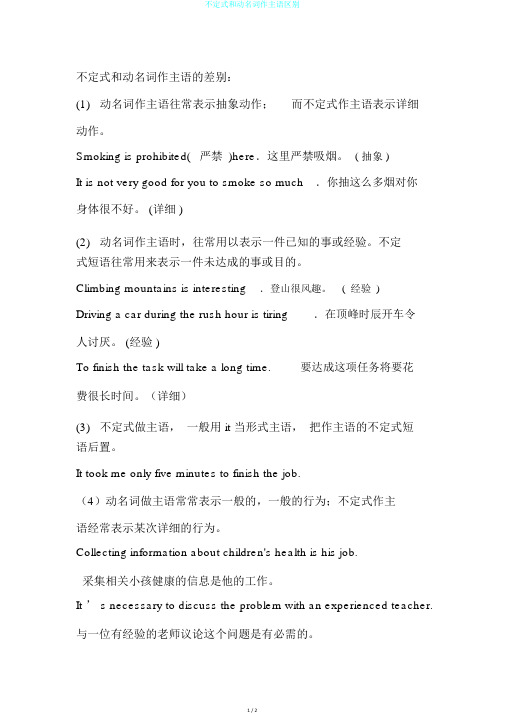
不定式和动名词作主语的差别:(1)动名词作主语往常表示抽象动作;而不定式作主语表示详细动作。
Smoking is prohibited(严禁)here.这里严禁吸烟。
( 抽象 )It is not very good for you to smoke so much.你抽这么多烟对你身体很不好。
(详细 )(2)动名词作主语时,往常用以表示一件已知的事或经验。
不定式短语往常用来表示一件未达成的事或目的。
Climbing mountains is interesting.登山很风趣。
(经验)Driving a car during the rush hour is tiring.在顶峰时辰开车令人讨厌。
(经验 )To finish the task will take a long time.要达成这项任务将要花费很长时间。
(详细)(3)不定式做主语,一般用 it 当形式主语,把作主语的不定式短语后置。
It took me only five minutes to finish the job.(4)动名词做主语常常表示一般的,一般的行为;不定式作主语经常表示某次详细的行为。
Collecting information about children's health is his job.采集相关小孩健康的信息是他的工作。
It ’ s necessary to discuss the problem with an experienced teacher. 与一位有经验的老师议论这个问题是有必需的。
2、常用不定式做主语的句型有:(1)It ’ s difficult (important, necessary) for sb. to do(2)It ’ s kind (good, friendly, polite, careless, rude, cruel, clever, foolish, brave) of sb. to do.3、常用动名词做主语的句型有:It ’ s no good (use, fun) doing.It ’ s (a) waste of time one’ s doing.。
高中英语---不定式和动名词做主语的区别

不定式和动名词作主语的区别非谓语动词除了不能独立作谓语外,可以承担句子的其他成分,如主语、宾语、表语、定语、补语。
非谓语动词中,不定式和动名词都可以做主语,也都可以借助于it把不定式和动名词移到句子后面。
一般来说,不定式作主语,表示具体的、一次性的或将来的动作;动名词作主语,表示一般的、泛指的或习惯性的行。
如:Smoking is prohibited(禁止)here .这里禁止抽烟.(抽象)It is not very good for you to smoke so much .你抽这么多烟对你身体很不好.(具体)通常只用不定式作主语的5种情况:1.It is necessary/important /impossible/ difficult •…(fob. ) to do sth. 句型如:It is necessary for us to master a foreign Ianguage. 我们有必要掌握一门夕卜语2.It is kind /foolish/clever/stupid/nice/rude/careless/friendly sb. ) to・doofth .句型,形容词常修饰人的特征如:It is very kind of you to help us. 你帮助我们真是太好了3. It takes/cost/require/make sb./sth. to do sth. 句型如It took me two hours to finish the work. 我完成那项工作用了两小时4. 不定式和when/where/how/what/whether 等连用,在句子中做主语如:Whether to do it hasn t been decided.是否去做还没有决定5. 主语被否定时如:Not to have hope is the poorest of all conditions. 绝望是最糟糕的事通常只用动名词用主语的6种情况:1. 含形容词的句子,It is good/foolish/wo nderful/ useless/ difficult /nice doing句型中如:It is useless try again. 再试也没用2. 含名词的句子,It is no fun/luck/pleasure/relief/mistake/pai n/use/good 句型中女口: It is no use waiting here doing nothing. 无所事事地等待是没有用的3. There is no (use/help/need) doing sth 句型如:There is no knowing what may happen in that case. 女口果那样的话不知道会发生什么事4. 在疑问句中如:Is doing morning exercises good for your health? 做早操对身体有益处吗?5. 在某些动词的被动式前如:Walking on the grass is forbidden. 禁止在这草地上行走。
动名词和不定式做主语的区别
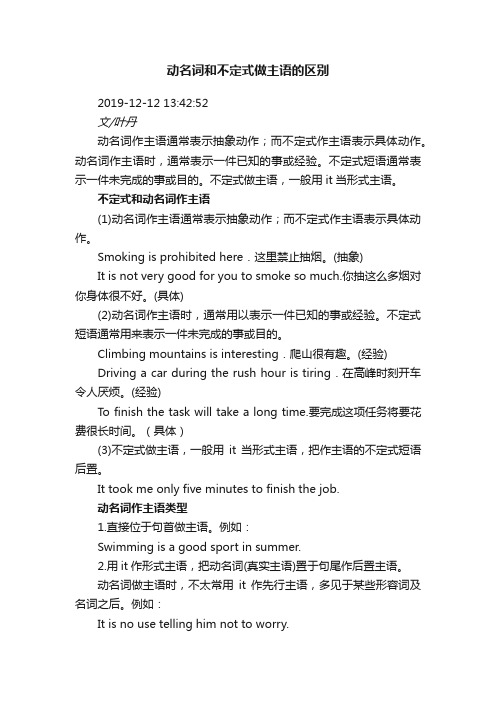
动名词和不定式做主语的区别2019-12-12 13:42:52文/叶丹动名词作主语通常表示抽象动作;而不定式作主语表示具体动作。
动名词作主语时,通常表示一件已知的事或经验。
不定式短语通常表示一件未完成的事或目的。
不定式做主语,一般用it当形式主语。
不定式和动名词作主语(1)动名词作主语通常表示抽象动作;而不定式作主语表示具体动作。
Smoking is prohibited here.这里禁止抽烟。
(抽象)It is not very good for you to smoke so much.你抽这么多烟对你身体很不好。
(具体)(2)动名词作主语时,通常用以表示一件已知的事或经验。
不定式短语通常用来表示一件未完成的事或目的。
Climbing mountains is interesting.爬山很有趣。
(经验)Driving a car during the rush hour is tiring.在高峰时刻开车令人厌烦。
(经验)To finish the task will take a long time.要完成这项任务将要花费很长时间。
(具体)(3)不定式做主语,一般用it当形式主语,把作主语的不定式短语后置。
It took me only five minutes to finish the job.动名词作主语类型1.直接位于句首做主语。
例如:Swimming is a good sport in summer.2.用it作形式主语,把动名词(真实主语)置于句尾作后置主语。
动名词做主语时,不太常用it 作先行主语,多见于某些形容词及名词之后。
例如:It is no use telling him not to worry.常见的能用于这种结构的形容词还有:better,wonderful,enjoyable,interesting,foolish,difficult,useless,senseless,worthwhile,等。
动名词和不定式作主语的比较
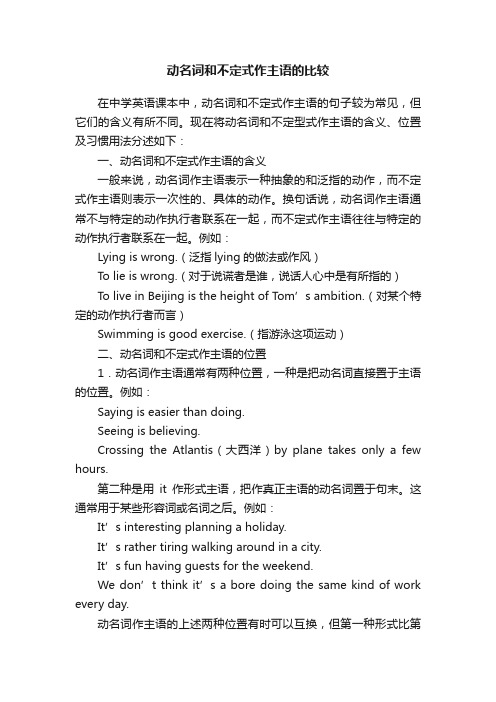
动名词和不定式作主语的比较在中学英语课本中,动名词和不定式作主语的句子较为常见,但它们的含义有所不同。
现在将动名词和不定型式作主语的含义、位置及习惯用法分述如下:一、动名词和不定式作主语的含义一般来说,动名词作主语表示一种抽象的和泛指的动作,而不定式作主语则表示一次性的、具体的动作。
换句话说,动名词作主语通常不与特定的动作执行者联系在一起,而不定式作主语往往与特定的动作执行者联系在一起。
例如:Lying is wrong.(泛指lying的做法或作风)To lie is wrong.(对于说谎者是谁,说话人心中是有所指的)To live in Beijing is the height of Tom’s ambition.(对某个特定的动作执行者而言)Swimming is good exercise.(指游泳这项运动)二、动名词和不定式作主语的位置1.动名词作主语通常有两种位置,一种是把动名词直接置于主语的位置。
例如:Saying is easier than doing.Seeing is believing.Crossing the Atlantis(大西洋)by plane takes only a few hours.第二种是用it作形式主语,把作真正主语的动名词置于句末。
这通常用于某些形容词或名词之后。
例如:It’s interesting planning a holiday.It’s rather tiring walking around in a city.It’s fun having guests for the weekend.We don’t think it’s a bore doing the same kind of work every day.动名词作主语的上述两种位置有时可以互换,但第一种形式比第二种形式的泛指意义更强些。
例如:Lining in Beijing must be wonderfulIt must be wonderful living in Beijing2.不定式作主语通常也有两种位置,与动名词作主语时的位置相同,即第一种是把不定式作直接置于句首担任主语。
动词不定式和动名词的区别与应用
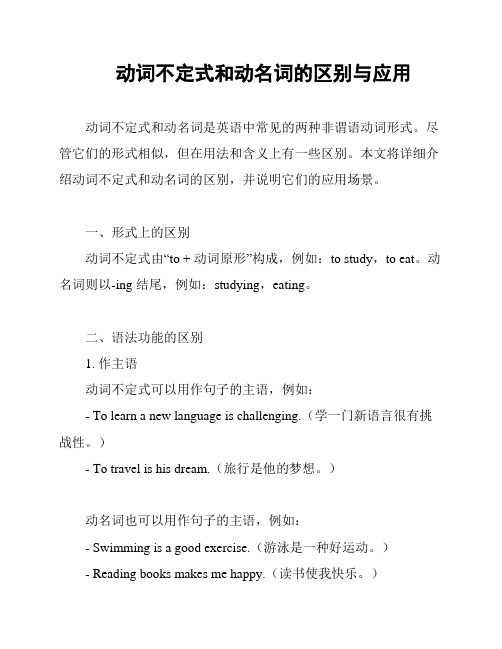
动词不定式和动名词的区别与应用动词不定式和动名词是英语中常见的两种非谓语动词形式。
尽管它们的形式相似,但在用法和含义上有一些区别。
本文将详细介绍动词不定式和动名词的区别,并说明它们的应用场景。
一、形式上的区别动词不定式由“to + 动词原形”构成,例如:to study,to eat。
动名词则以-ing 结尾,例如:studying,eating。
二、语法功能的区别1. 作主语动词不定式可以用作句子的主语,例如:- To learn a new language is challenging.(学一门新语言很有挑战性。
)- To travel is his dream.(旅行是他的梦想。
)动名词也可以用作句子的主语,例如:- Swimming is a good exercise.(游泳是一种好运动。
)- Reading books makes me happy.(读书使我快乐。
)2. 作宾语动词不定式可以用作及物动词的宾语,例如:- I want to learn Spanish.(我想学西班牙语。
)- She likes to eat fruits.(她喜欢吃水果。
)动名词也可以用作及物动词的宾语,例如:- I enjoy swimming every morning.(我喜欢每天早上游泳。
)- He admitted stealing the money.(他承认偷了那笔钱。
)3. 作介词宾语动词不定式可以用作介词宾语,例如:- She is good at playing the guitar.(她弹吉他很好。
)- He is interested in learning Chinese.(他对研究中文感兴趣。
)动名词也可以用作介词宾语,例如:- They are looking forward to visiting Paris.(他们期待着去巴黎旅行。
)三、意义和用法的区别1. 动词不定式带有“to”的含义,表示目的、意图、可能性、建议等,例如:- I went to the store to buy some bread.(我去商店买面包。
动词的不定式与动名词的区别

动词的不定式与动名词的区别动词的不定式(infinitive)和动名词(gerund)是英语中两种常见的非谓语动词形式。
尽管在形式上它们有一些相似之处,但在用法和含义上有明显的区别。
本文将详细介绍动词的不定式和动名词的区别,以便读者更好地理解和运用它们。
一、形式上的区别1. 动词的不定式通常由“to + 动词原形”构成,例如:to learn,to eat,to go等。
2. 动名词则是在动词原形后面直接加上-ing,例如:learning,eating,going等。
二、用法上的区别1. 主语的区别:a) 不定式作为主语:不定式一般用作主语时,表示一种抽象的行为、概念或目的。
例如:- To learn a new language is challenging.(学一门新语言很有挑战性。
)b) 动名词作为主语:动名词用作主语时,表示一种具体的、实际的行为或活动。
例如:- Reading helps expand your vocabulary.(阅读有助于扩大你的词汇量。
)2. 宾语的区别:a) 不定式作为宾语:不定式可以作为及物动词或不及物动词的宾语,常用于某些动词后,例如:want,hope,decide等。
例如: - She wants to learn Chinese.(她想学中文。
)b) 动名词作为宾语:动名词一般用作及物动词的宾语,常用于某些动词后,例如:enjoy,like,dislike等。
例如:- He enjoys swimming in the ocean.(他喜欢在海里游泳。
)3. 表语的区别:a) 不定式作为表语:不定式可以用作表语,通常用于表示完成、未来或可能性等。
例如:- His dream is to become a doctor.(他的梦想是成为一名医生。
)b) 动名词作为表语:动名词不常用作表语。
4. 定语的区别:a) 不定式作为定语:不定式可以用作修饰名词或代词的定语,常用于表示目的、原因或解释等。
- 1、下载文档前请自行甄别文档内容的完整性,平台不提供额外的编辑、内容补充、找答案等附加服务。
- 2、"仅部分预览"的文档,不可在线预览部分如存在完整性等问题,可反馈申请退款(可完整预览的文档不适用该条件!)。
- 3、如文档侵犯您的权益,请联系客服反馈,我们会尽快为您处理(人工客服工作时间:9:00-18:30)。
不定式和动名词作主语的区别:
(1) 动名词作主语通常表示抽象动作;而不定式作主语表示具体
动作。
Smoking is prohibited(禁止)here.这里禁止抽烟。
(抽象)
It is not very good for you to smoke so much.你抽这么多烟对你
身体很不好。
(具体)
(2) 动名词作主语时,通常用以表示一件已知的事或经验。
不定
式短语通常用来表示一件未完成的事或目的。
Climbing mountains is interesting.爬山很有趣。
(经验)
Driving a car during the rush hour is tiring.在高峰时刻开车令
人厌烦。
(经验)
To finish the task will take a long time.要完成这项任务将要花
费很长时间。
(具体)
(3) 不定式做主语,一般用it当形式主语,把作主语的不定式短
语后置。
It took me only five minutes to finish the job.
(4)动名词做主语往往表示普通的,一般的行为;不定式作主
语常常表示某次具体的行为。
Collecting information about children's health is his job.
收集有关儿童健康的信息是他的工作。
It’s necessary to discuss the problem with an experienced teacher. 与一位有经验的老师讨论这个问题是有必要的。
2、常用不定式做主语的句型有:
(1)It’s difficult (important, necessary) for sb. to do
(2)It’s kind (good, friendl y, polite, careless, rude, cruel, clever, foolish, brave) of sb. to do.
3、常用动名词做主语的句型有:
It’s no good (use, fun) doing.
It’s (a) waste of time one’s doing.。
